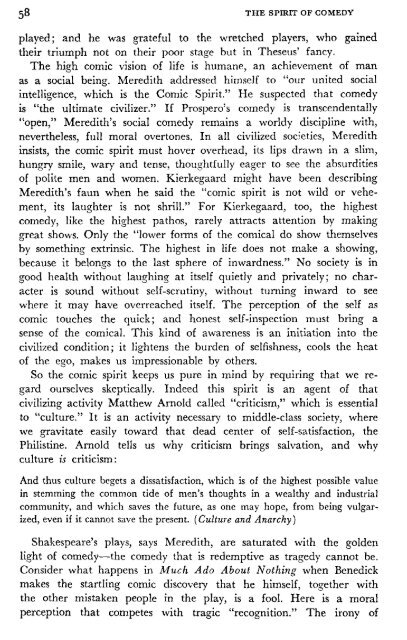The Meanings of Comedy* - Shakespeare Navigators
The Meanings of Comedy* - Shakespeare Navigators
The Meanings of Comedy* - Shakespeare Navigators
Create successful ePaper yourself
Turn your PDF publications into a flip-book with our unique Google optimized e-Paper software.
58<br />
TIrE SPIRIT OF COMEDY<br />
played; and he was grateful to the r.r'retched players, who gained<br />
their triumph not on their poor stage but in <strong>The</strong>seus' fancy.<br />
<strong>The</strong> high comic vision <strong>of</strong> life is humane, an achievement <strong>of</strong> man<br />
as a social being. Meredith addressed himself to "our united social<br />
intelligence, which is the Comic Spirit." He suspected that comedy<br />
is "the ultimate civilizer." If Prospero's comedy is transcendentaily<br />
"open," Meredith's social comedy remains a worldy discipline with,<br />
nevertheless, full moral overtones. In all civilized societies, Meredith<br />
insists, the comic spirit must hover overhead, its lips drarvn in a slim,<br />
hungry smile, wary and tense, thoughtfully eager to see the absurdities<br />
<strong>of</strong> polite men and women. Kierkegaard might have been describing<br />
Meredith's faun when he said the "comic spirit is not wild or vehement,<br />
its laughter is not shrill." For Kierkegaard, too, the highest<br />
comedy, like the highest pathos, rarely attracts attention by making<br />
great shows. Only the "lower forms <strong>of</strong> the comical do show themselves<br />
by something extrinsic. <strong>The</strong> highest in life does not make a showing,<br />
because it belongs to the last sphere <strong>of</strong> inwardness." No society is in<br />
good health without laughing at itself quietly and privately; no character<br />
is sound without self-scrutiny, without turning inward to see<br />
where it may have overreached itself. <strong>The</strong> perception <strong>of</strong> the self as<br />
comic touches the quick; and honest self-inspection must bring a<br />
sense <strong>of</strong> the comical. This kind <strong>of</strong> awareness is an initiation into the<br />
civilized condition; it lightens the burden <strong>of</strong> selfishness, cools the heat<br />
<strong>of</strong> the ego, makes us impressionable by others.<br />
So the comic spirit keeps us pure in mind by requiring that we regard<br />
ourselves skeptically. Indeed this spirit is an agent <strong>of</strong> that<br />
civilizing activity Matthew Arnold called "criticism," which is essential<br />
to "culture." It is an activity necessary to middle-class society, where<br />
we gravitate easily toward that dead center <strong>of</strong> self-satisfaction, the<br />
Philistine. Arnold tells us why criticism brings salvation, and why<br />
culture is criticism:<br />
And thus culture begets a dissatisfaction, which is <strong>of</strong> the highest possible value<br />
in stemming the common tide <strong>of</strong> men's thoughts in a wealthy and industrial<br />
community, and which saves the future, as one may hope, from being vulgarized,<br />
even if it cannot save the present. (Culture and Anarchy)<br />
<strong>Shakespeare</strong>'s plays, says Meredith, are saturated with the golden<br />
light <strong>of</strong> comedy-the comedy that is redemptive as tragedy cannot be.<br />
Consider what happens in Much Ado About Nothing when Benedick<br />
makes the startling comic discovery that he himself, together with<br />
the other mistaken people in the play, is a fool. Here is a moral<br />
perception that competes with tragic "recognition." <strong>The</strong> irony <strong>of</strong>


